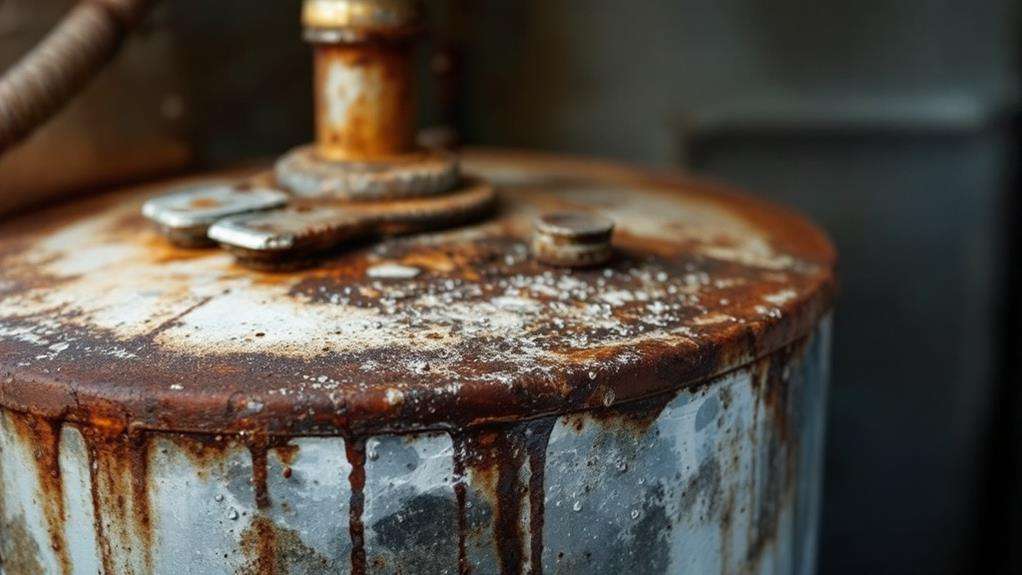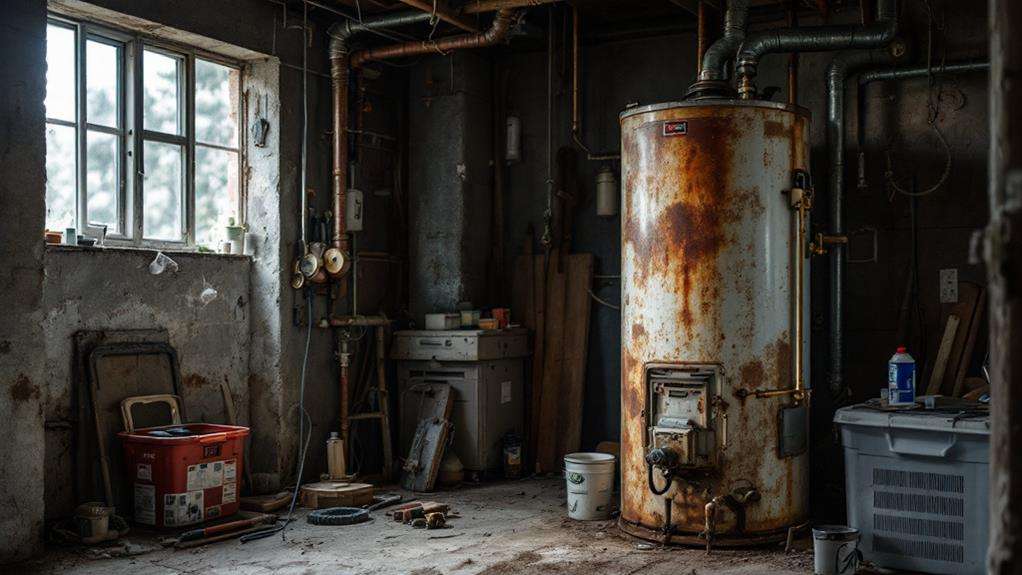How Long Do Water Heaters Last? Signs of Wear and Tear
Water heaters typically last 8 to 12 years, but their lifespan can vary significantly based on factors like water quality and maintenance. You'll know it's time to replace your water heater if you notice reduced efficiency, sediment buildup, higher energy costs, or decreasing water pressure. Staying on top of regular tasks like flushing the tank and checking the anode rod can help extend its life. And if you're starting to see these warning signs, it's a good idea to start planning for a replacement - there's more to consider than you might think.
Key Takeaways
- Water heaters typically have an average lifespan of 8 to 12 years, with glass-lined steel tanks generally lasting longer than bare steel.
- Hard water, humid environments, and lack of maintenance can accelerate sediment buildup and corrosion, leading to reduced efficiency and shorter lifespan.
- Early warning signs of wear and tear include longer water heating times, decreased water pressure, and increased energy costs.
- Regular maintenance, such as flushing the tank and replacing the anode rod, can significantly prolong the water heater's lifespan.
- When preparing for water heater replacement, it's important to research energy-efficient models and hire a licensed plumber for proper installation.
Average Lifespan of Water Heaters
The average lifespan of a water heater typically ranges from 8 to 12 years, though this can vary depending on several factors. The tank material composition and the condition of the heating element play a significant role in determining the longevity of your water heater.
Tanks made of glass-lined steel generally last longer than those made of bare steel, which are more susceptible to corrosion. Additionally, the quality and maintenance of the heating element can impact the overall lifespan of the unit. Regular flushing and sediment removal help extend the life of the heating element, which is essential for efficient and reliable hot water production.
Environmental factors, such as water quality and usage patterns, can also influence the water heater's lifespan. Hard water, for instance, can accelerate the buildup of mineral deposits, leading to decreased efficiency and potential failure. Proper maintenance and monitoring of your water heater can help you get the most out of your investment and avoid unexpected, costly replacements.
Factors Affecting Water Heater Longevity
Several factors can impact the longevity of your water heater. The water quality conditions in your area play a significant role. Hard water, which is high in mineral content, can lead to sediment buildup and corrosion within the tank, shortening its lifespan. To combat this, you may want to consider installing a water softener.
The installation location of your water heater is another crucial factor. Placing it in a humid, damp, or excessively hot environment can accelerate wear and tear. Ideally, your water heater should be situated in a dry, well-ventilated area, away from direct heat sources.
Regular maintenance, such as flushing the tank and checking the anode rod, can also prolong your water heater's life. By addressing these factors, you can ensure your water heater operates efficiently and lasts as long as possible.
Early Warning Signs of Wear and Tear

As a water heater ages, there are a few early warning signs you should watch out for. One of the most common is mineral buildup, which can cause the water heater to work harder and become less efficient over time. You might notice that it takes longer to heat water or that the water pressure is lower.
Another early sign of wear and tear is sediment accumulation. Over time, minerals and other materials can settle at the bottom of the tank, reducing the heater's capacity and efficiency. This can lead to increased energy costs and even premature failure of the water heater.
If you notice either of these issues, it's best to address them promptly to extend the life of your water heater. Regular maintenance, such as flushing the tank and checking for corrosion, can help prevent these problems and ensure your water heater continues to function reliably for years to come.
Maintaining Water Heater Efficiency
Maintaining your water heater's efficiency is key to ensuring it operates at its best and lasts as long as possible. Regular tank cleaning is a crucial step in keeping your water heater running smoothly. Over time, sediment can build up in the tank, reducing the heater's efficiency and potentially leading to premature failure. By flushing your water heater periodically, you can remove this buildup and prolong its lifespan.
Additionally, it's important to check your anode rod regularly. The anode rod helps protect the tank from corrosion, and replacing it when necessary can extend the life of your water heater. Insulating your water heater can also improve efficiency, reducing energy costs and prolonging its operation.
Preparing for Water Heater Replacement

When the time comes to replace your water heater, it's crucial to plan ahead. Preparing for this replacement can help you make informed decisions and ensure a smooth transition.
Consider these key factors:
- Budget-Friendly Options: Explore various water heater models that fit your budget. Energy-efficient options, such as tankless or hybrid units, may cost more upfront but can save you money in the long run through lower energy bills.
- Professional Installation Considerations: Hiring a licensed and experienced plumber is essential for a proper water heater installation. They can ensure the new unit is sized correctly, connected safely, and integrated seamlessly with your home's plumbing system.
- Timing and Logistics: Plan the replacement well in advance to avoid any disruptions to your hot water supply. Coordinate with the plumber to schedule the installation at a convenient time, and make arrangements for any necessary temporary solutions during the process.
